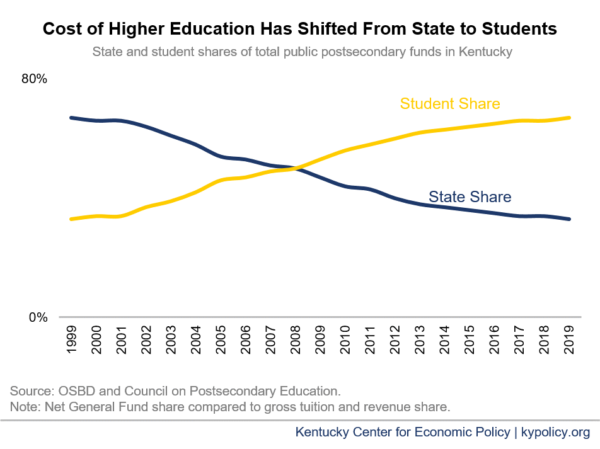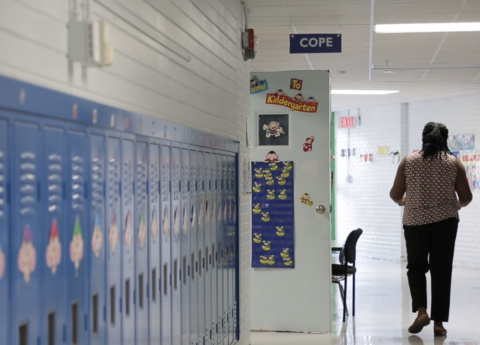Too many college students in Kentucky returning to school in-person and online during the pandemic face challenges getting adequate food and housing. Meeting such basic needs was already a struggle for many – a struggle that the pandemic and economic crisis is worsening. While some individual campus interventions such as on-campus food banks should be sustained and even expanded, Congress as well as Kentucky lawmakers need to do more to address basic needs insecurity for college students.
College students experienced basic needs insecurity prior to COVID-19
Even outside of the pandemic, food and housing insecurity among college students is widely understood as a significant problem that jeopardizes students’ success in school. Basic needs insecurity can impact grades and degree completion in addition to health and well-being. For instance, according to a survey by the American Association of Collegiate Registrars and Admissions Officers, 86% of responding institutions identified food and housing insecurity as drivers of students not completing their degrees.
Another survey by The Hope Center looks annually at basic needs insecurity among college students across the country. Of the nearly 167,000 students surveyed in 2019:
- 39% were food insecure in the prior 30 days.
- 46% were housing insecure in the previous year.
- 17% were homeless in the previous year.
The Hope Center survey found that basic needs insecurity is especially common among students attending community college, students of color, parenting students, formerly incarcerated students, LGBTQ students and students who spent time in foster care. And students experiencing basic needs insecurity were overwhelmingly students working while attending college.
Financial instability – which includes housing insecurity, food insecurity, and lack of transportation and child care – is one of several nonacademic barriers to success for students in the Kentucky Community and Technical College System (KCTCS). In academic year 2017, an estimated 35% of KCTCS students had incomes under $20,000 a year and 34% had dependents – factors increasing their likelihood of basic needs insecurity. In addition, results from a basic needs survey of University of Kentucky students indicated that 43% of respondents experienced some level of food insecurity in the past 12 months and 8% of students had some form of housing insecurity.
Inadequate state higher education funding worsens financial strain on students
The rising cost of public higher education is a contributor to students’ financial challenges and a problem that has been worsening in Kentucky in recent years. The graph below shows how over time, amidst state budget cuts to public universities and community colleges, students are shouldering a greater share of the costs of public higher education in Kentucky while the state’s share declines.
Even for students receiving the maximum federal Pell Grant amount, only about half of the total cost of attendance is covered at a community college in Kentucky (total cost includes tuition plus housing, transportation, books and more). That means once Pell is applied toward tuition and fees – even if a student also receives a state need-based scholarship – there is not enough money remaining to cover the numerous additional costs of college such as housing and other basic needs.
Tuition didn’t go up at all this year at several public universities — and it rose only a little at other public higher education institutions including the community college system. In addition, for the first time in years, state funding for higher education was spared another round of cuts in the state budget. However, the cumulative impacts of many rounds of state budget cuts, the implementation of performance funding amidst these cuts (which has led to funds being shifted from institutions serving more low-income students and students of color) and corresponding tuition increases have made college unaffordable for many Kentucky students, especially when household income is factored in.
Basic needs challenges have intensified amidst the pandemic
Basic needs challenges have worsened for many college students in COVID-19, especially for those among the more than 240,000 Kentuckians who continue to be out of jobs due to the pandemic, with still more having lost hours and wages.
In another Hope Center survey of more than 38,000 college students across the country this spring, nearly three in five were experiencing basic needs insecurity. Unlike before the pandemic when students in two-year institutions experienced more food and housing insecurity, in the spring students in two- and four-year institutions were equally likely to experience insecurity overall.
Of the surveyed students who were employed before the pandemic, 33% of the two-year college students and 42% of four-year students lost at least one job, while 32% of two-year students and 28% of four-year students experienced a reduction in hours and/or pay. The majority of these students experienced basic needs insecurity — with 70% of students losing a job experiencing basic needs insecurity and 63% of students whose pay or hours were cut.
These challenges are compounded by pandemic-related anxiety and difficulty concentrating on school. Half of respondents reported experiencing at least moderate anxiety. Half of respondents at two-year colleges – and 63% at four-year colleges – said they had trouble concentrating on school during the pandemic.
Federal aid among solutions needed to support students
In Kentucky and across the nation, some colleges and universities are responding to student food and housing insecurity by providing food pantries, central locations for basic needs resources and staff committed to addressing basic needs. These supports can help students get adequate nutrition and connect them to assistance they may not know they are eligible to receive.
However, more needs to be done to help Kentucky students in this time of crisis, particularly at the federal level. Congress must pass a federal aid package that prevents more state budget cuts to higher education by including significant revenue relief for states — and targeted monies to help college students meet basic needs is one good potential use of relief funds. Additional federal aid to individuals should extend the $600 supplemental unemployment insurance benefit, boost SNAP food assistance maximum benefits by 15%, and provide rent relief. These measures are critical in order to support Kentucky students and families, as well as the economy into which these students will eventually, hopefully graduate.




